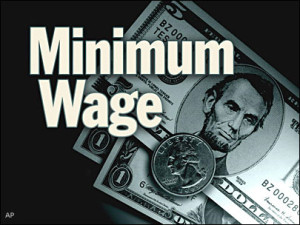 Connecticut, Minnesota, West Virginia, Delaware, Maryland, and Washington D.C. have recently increased their minimum wage requirements. All of these increases will take place gradually over a certain number of years. Household employers who pay their employees minimum wage must be aware of these increases and adjust the amount accordingly. Below are detailed descriptions of the changing requirements for each state:
Connecticut, Minnesota, West Virginia, Delaware, Maryland, and Washington D.C. have recently increased their minimum wage requirements. All of these increases will take place gradually over a certain number of years. Household employers who pay their employees minimum wage must be aware of these increases and adjust the amount accordingly. Below are detailed descriptions of the changing requirements for each state:
Connecticut
Governor Malloy has signed legislation that will raise the Connecticut minimum wage to $10.10 through a series of gradual increases over the next three years. The first increase will raise the state minimum wage from $8.70 to $9.15 on January 1, 2015. The rate will further increase to $9.60 on January 1, 2016, and finally to $10.10 on January 1, 2017.
Minnesota
Governor Dayton signed legislation that will increase Minnesota’s minimum wage gradually over a number of years from one of the lowest in the country to one of the highest. Minnesota has two different minimum wages: one for small employers and one for large employers. Currently, both rates are well below the federal minimum wage; thus, the minimum wage for all non-tipped workers is the federal minimum of $7.25 per hour. For businesses with less than $500,000 in gross annual sales, the minimum wage rate will increase to $6.50 on August 1, 2014 (though the federal rate of $7.25 will still apply); to $7.25 on August 1, 2015; and to $7.75 on August 1, 2016. For businesses with $500,000 or more in gross annual sales, the minimum wage rate will increase to $8.00 on August 1, 2014; to $9.00 on August 1, 2015; and to $9.50 on August 1, 2016.
West Virginia
Governor Tomblin has signed legislation into law that will raise the minimum wage in West Virginia twice in the next two years. An initial increase from the current rate of $7.25 per hour to $8.00 per hour will become effective on January 1, 2015. The rate will then increase again on January 1, 2016 to $8.75 per hour. In addition, the training wage for employees under the age of 20 during their first 90 days of employment will increase from $5.15 per hour to $6.40 an hour beginning on January 1, 2015.
Delaware
Governor Markell has signed legislation increasing Delaware’s minimum wage in two increments. The first increase will go into effect on June 1, 2014 and will raise the state minimum wage from $7.25 to $7.75. The rate will further increase to $8.25 effective June 1, 2015.
Maryland
The Maryland legislature has passed a bill that will raise Maryland’s minimum wage to $10.10 per hour by 2018 through a series of incremental increases. The bill, which is expected to be signed by Governor O’Malley in the near future, would raise the state minimum wage from the current rate of $7.25 per hour to: $8.00 on January 1, 2015; $8.25 on July 1, 2015; $8.75 on July 1, 2016; $9.25 on July 1, 2017; and $10.10 on July 1, 2018.
Washington D.C.
The Washington D.C. city council has voted unanimously to increase to minimum wage incrementally over the next three years. On July 1, 2014, the rate will increase from the current $8.25 per hour to $9.50 per hour. The minimum wage rate will further increase to $10.50 per hour on July 1, 2015 and then to $11.50 per hour effective July 1, 2016. After 2016, the minimum wage rate in Washington D.C. will be tied to a consumer price index.
For more information on wage rates in your state or to learn about paying your employee legally, please contact GTM’s Household Employment Experts at (888) 432-7972.






 Get your free:
Get your free: